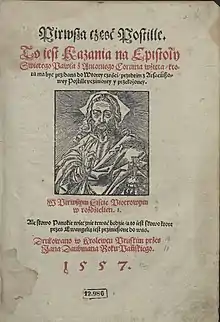Eustachy Trepka
Eustachy Trepka (born around 1510, died October 17, 1558[1]) was a Polish Lutheran theologian, pastor, and translator.[1]

Trepka's family had its origins near Sieradz and Wielkopolska. According to some sources his family was nicknamed Nękanda[2] with a coat of arms Topór.[3]
Eustachy attended the Lubrański Academy in Poznań where he was mostly likely a student of the Lutheran theologian Christoph Hegendorff. He was also probably a tutor to the Górka family, who were his protectors.[3] In the 1540s, together with his sponsor Andrzej Górka, Trepka traveled to Wittemberg and met Martin Luther and his collaborator Philipp Melanchthon.[4]
Subsequently, in 1546, he was invited by Duke Albert of Prussia to come to Królewiec (Königsberg, today Kaliningrad), the capital of Duchy of Prussia which at the time was a fief of Kingdom of Poland. There, Trepka was tasked by the Duke with carrying out translations of religious work from Latin into Polish, and he was employed in the print shop of Hans Daubmann.[2] He also published with Daubmann's competitor, Aleksander Augezdecky.[5]
Works translated by Trepka include Mleko duchowne dla karmienia i wychowywania chrześcijańskich dziatek, 1556 ("Spiritual milk for nourishment and upbringing of Christian children"),[5] by the Spanish theologian Juan de Valdés, and the Large Catechism of Johannes Brenz.[6]
Trepka served as the Duke's adviser[7] in regard to Polish affairs and in house translator. His son, Jerzy Trepka, was also employed by the Duke.[6]
Eustachy Trepka was an ideological opponent of the Polish Protestant evangelical reformer Jan Łaski and the Congregationists of Greater Poland.[8]
References
- Bodensieck, Julius, ed. (1965). "Trepka, eustachy". The encyclopedia of the Lutheran Church. 3. Augsburg: Lutheran World Federation. p. 2413.
- "Eustachy Trepka". Slownik Polszczyzny XVI Wieku. Instytut Badan Literackich Polskiej Akademi Nauk. Archived from the original on 2012-12-21.
- Bartoszewicz, Julian (1861). Historja literatury polskiej. M. Glücksberg. pp. 195.
- Król, Jozef (2009-01-04). "Z życia i wiary. Czasy... Ludzie... Wydarzenia..." (PDF). Informator Parafialny. Parafia Jaworze. p. 12. Archived from the original (PDF) on February 3, 2014. Retrieved September 18, 2012.
- Jasiński, Janusz (1994). Historia Królewca: szkice z XIII-XX stulecia. Olsztyn: Ksiaznia Polska. pp. 65–67. ISBN 83-85702-03-2.
- Krueger, Karl (1992). Psalms and Potatoes: The congregations of the Polish-speaking Protestant Mazurians in East Prussia, Suwalki, Poland, and the United States. University of Michigan (PhD thesis). p. 85.
- Arb, Ingrid (2004). "Hans Daubmann und der Konigsberger Buchdruck im 16. Jahrhundert - Eine Profilskizze". In Walter, Axel (ed.). Königsberger Buch- und Bibliotheksgeschichte. Böhlau Verlag Köln Weimar. p. 108.
- Lueker, E.; Poellot, L.; Jackson, P. (eds.). "Trepka, Eustachy". Christian Cyclopedia. Lutheran Church - Missouri Synod. Retrieved September 16, 2012.